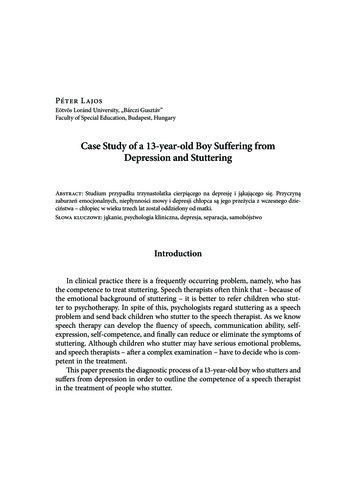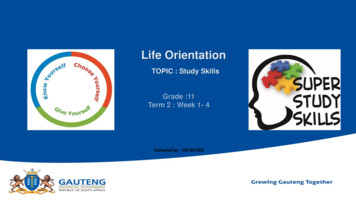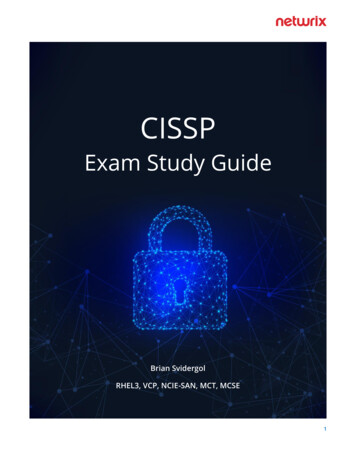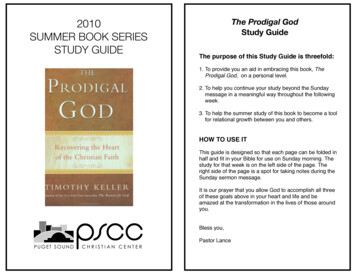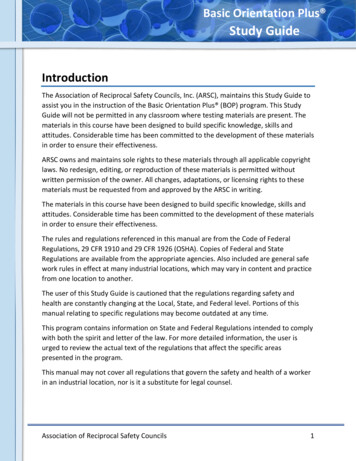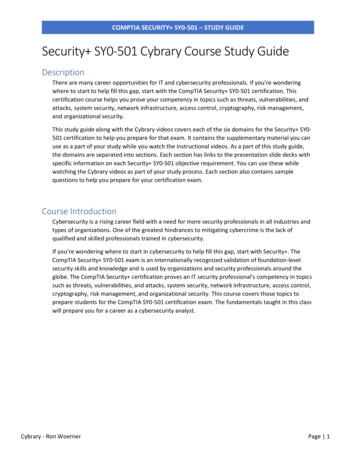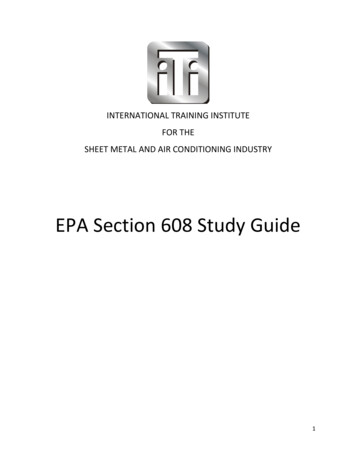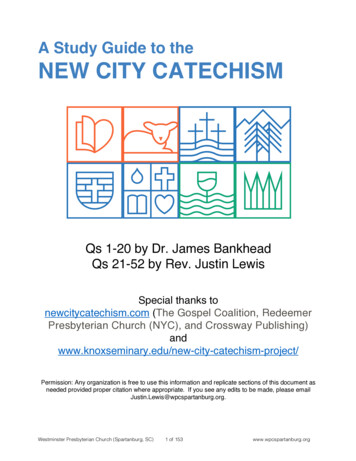
Transcription
A Study Guide to theNEW CITY CATECHISMQs 1-20 by Dr. James BankheadQs 21-52 by Rev. Justin LewisSpecial thanks tonewcitycatechism.com (The Gospel Coalition, RedeemerPresbyterian Church (NYC), and Crossway ism-project/Permission: Any organization is free to use this information and replicate sections of this document asneeded provided proper citation where appropriate. If you see any edits to be made, please emailJustin.Lewis@wpcspartanburg.org.Westminster Presbyterian Church (Spartanburg, SC)1 of 153www.wpcspartanburg.org
Table of ContentsPART 1 God, creation and fall, law.Suggested Leader Guide for Question 1 . 4Q.1 What is our only hope in life and death?. 5Q.2 What is God? . 10Excursus on Question 2 . 13Q.3 How many persons are there in God? . 23Q.4 How and why did God create us? . 26Q.5 What else did God create? . 28Q.6 How can we glorify God? . 31Q.7 What does the law of God require? . 35Q.8 What is the law of God stated in the Ten Commandments? . 39Q.9 What does God require in the first, second and third Commandments? . 42Q.10 What does God require in the fourth and fifth Commandments? . 46Q.11 What does God require in the sixth, seventh and eighth Commandments? . 48Q.12 What does God require in the ninth and tenth Commandments?. 51Q.13 Can anyone keep the law of God perfectly? . 55Q.14 Did God create us unable to keep his law? . 59Q.15 Since no one can keep the law, what is its purpose?. 64Q.16 What is sin? . 67Q.17 What is idolatry?. 70Q.18 Will God allow our disobedience and idolatry to go unpunished? . 75Q.19 Is there any way to escape punishment and be brought back into God’s favor? . 80Q.20 Who is the redeemer? . 85PART 2 Christ, redemption, graceQ.21 What sort of Redeemer is needed to bring us back to God?. 89Q.22 Why must the Redeemer be truly human? . 91Q.23 Why must the Redeemer be truly God?. 92Q.24 Why was it necessary for Christ, the Redeemer, to die? . 94Q.25 Does Christ’s death mean all our sins can be forgiven? . 96Q.26 What else does Christ’s death redeem? . 98Q.27 Are all people, just as they were lost through Adam, saved through Christ? . 100Q.28 What happens after death to those not united to Christ by faith? . 103Q.29 How can we be saved? . 106Westminster Presbyterian Church (Spartanburg, SC)2 of 153www.wpcspartanburg.org
Q.30 What is faith in Jesus Christ? . 108Q.31 What do we believe by true faith?. 110Q.32 What do justification and sanctification mean? . 112Q.33 Should those who have faith in Christ seek their salvation through their own works, oranywhere else? . 114Q.34 Since we are redeemed by grace alone, through Christ alone,must we still do good works and obey God’s Word? . 116Q.35 Since we are redeemed by grace alone, through faith alone,where does this faith come from? . 118PART 3 Spirit, restoration, growing in grace.Q.36 What do we believe about the Holy Spirit . 120Q.37 How does the Holy Spirit help us? . 122Q.38 What is prayer? . 124Q.39 With what attitude should we pray? . 126Q.40 What should we pray? . 128Q.41 What is the Lord’s Prayer? . 130Q.42 How is the Word of God to be read and heard?. 132Q.43 What are the sacraments or ordinances? . 134Q.44 What is baptism?. 136Q.45 Is baptism with water the washing away of sin itself? . 138Q.46 What is the Lord’s Supper? . 140Q.47 Does the Lord’s Supper add anything to Christ’s atoning work? . 142Q.48 What is the church?. 144Q.49 Where is Christ now? . 146Q.50 What does Christ’s resurrection mean for us? . 148Q.51 Of what advantage to us is Christ’s ascension? . 150Q.52 What hope does everlasting life hold for us? . 152Westminster Presbyterian Church (Spartanburg, SC)3 of 153www.wpcspartanburg.org
Suggested Leader Guide for Question 1The Study Guide for Group participants is intended to help the user reflect upon and interactpersonally with Scripture, with their own inner being and experience and with the issue inthe specific Catechism Question. The hope is that in this way the Catechism answer willbecome more real in their hearts and in the collective heart of your group.Question 1 asks what our hope is. The dictionary defines “hope” as “a feeling that what iswanted is likely to happen; desire accompanied by expectation.” Thus, “hope” has to do with“conviction,” “confidence,” “expectations,” desires” and “wants.” Interestingly, the word“hope” does not appear in Scripture in the Old Testament (OT) until Ruth 1:12. The OTbegins to say a great deal about “hope”:“Be of good courage, and He shall strengthen your heart, all you who hope in theLord,” Psalm 31:24.“Blessed is the person who trusts in the Lord, whose hope [KJV; “confidence,” NIV]is in him,” Jeremiah 17:7.Peter says in his Acts 2 message on the day of Pentecost, “Therefore, my heart isglad and my tongue rejoices; my body will also live in hope,” 2:26, as he proclaimsJesus’ resurrection to those gathered.Romans 4:18 says, “Against all hope, Abraham in hope believed and so became thefather of many nations, just as it had been said, ‘So shall your offspring be.”(Abraham set his hope that God would fulfill his promise that he would have s sonas his heir and it would not be the son of his servant.)“For everything that was written in the past was written to teach is, so that throughendurance and the encouragement of the Scripture we might have hope,”Romans 15:4.The truth is that we have the ability to attach our hopes to people, to things and to God inJesus. This is why it is important to reflect upon and evaluate the object of our hope. It isimportant to do this because, without realizing it, we can attach our hopes to people, tothings, to experiences and to ideas about God that let us down and disappoint usThe following are avenues you may choose to follow in facilitating your group’s discussionsand reflections on Question 1:Avenue 1: Because some will have done their homework and some may not, selectsome of the questions on page 2 from “Your former hope, identity and desire,”such as “Where were you born?” Where was the center of warmth in your home?”and “How did your relationship with Jesus begin?” If there is time left, you maywant to ask the group questions on page 2.Avenue 2: On page 2, start with “Your New self hope, identity and desires” and gothrough the process and group questions on page 3.Avenue 3: Ask the question on page 3 & 4.Avenue 4: Choose questions from all three Avenues to discuss in your group.Be sure to pray for the members of your group during the week and to pray in your groupboth at the start and when you close. Leave room for the Holy Spirit to change thedirection your group takes and to go with the flow. Bless you as you seek to follow Hisguidance.Westminster Presbyterian Church (Spartanburg, SC)4 of 153www.wpcspartanburg.org
New City CatechismQuestion 1What is our only hope in life and death?That we are not our own but belong, body and soul, both in lifeand death, to God and to our Savior Jesus Christ.THE NEW CITY CATECHISMBesides these Study Guides, there are several additional resources for digging intothe New City Catechism. Timothy Keller, one of the organizing contributors for thedevelopment of this catechism, has short videos at www.newcitycatechism.com. Dr. MichaelAllen offers more extended input on each question at www.knoxseminary.edu/new-citycatechism-project/. Please use these excellent resources in preparing to interact with othersin your small group.The purpose of this catechism is to ground church members in the essentials ofBiblical faith. Many members of churches have too little knowledge much less understandingof the truths of Scripture. The New City Catechism seeks to provide you with a positive wayto grasp the basic issues of our faith.The New City Catechism uses the ancient educational method of “catechesis.” Thisword comes from Greek “to teach verbally” or orally. This method organizes the essentialelements of the Bible’s truth into fifty-two questions and answers drawn from Scripturalrevelation.Colossians 3:16 charges church members: “Let the word of Christ dwell in you richlyas you teach and admonish one another with all wisdom ”. In your group, you will bestarting with the first twenty questions. These questions will help you think through your hopein this life and in death. You will dig into your identity as God’s redeemed child, into God’sidentity and character, into the nature of his person, into what God has done, into how weglorify God, into some specifics of God’s communication to his children and what he revealsabout us through it, into God’s response to sin and into God’s way of taking upon himselfour punishment for our sin. These are the essential issues to which the twenty questionsgive solid answers.NCC: QUESTION 1 – WHAT IS OUR ONLY HOPE IN LIFE AND DEATH?Question 1 asks you about your “only hope” and quotes from one of the apostle Paul’sletters. In another letter, Paul writes to church members in the city of Ephesus. They wereprimarily Gentiles. Most Ephesian believers had not grown up in synagogues nor had theylearned the hope and ways of God in Scripture. There was a clear distinction between thelives and hopes they had before coming to faith in Jesus and the new hope and the newlives they now had as followers of Jesus. Paul writes:“You were taught, with regard to your former way of life, to put off your old self, whichis being corrupted by its deceitful desires, to be made new in the attitude of your minds, andto put on the new self, created to be like God in true righteousness and holiness.”Westminster Presbyterian Church (Spartanburg, SC)5 of 153www.wpcspartanburg.org
Apparently, to grow in following Jesus, church members needed to understand how theirformer way of life and former hope did not help them mature in faith and obedience. Instead,its desires corrupted their faith and obedience.Those of us who did not grow up in a church are well aware of our “former way of life”and the hopes and desires that governed us. There is a very clear distinction of our hopesand desires before and after coming to faith in Jesus. However, many of us who grew in achurch do not realize that we too have a “former way of life” with false hopes and corruptingdesires. This distinction is not as clear for us. Since we have always been in and around achurch, our hope and identity as a Christian is mixed in with our “former way of life” and itshopes and desires. We need to understand what about our church life is a part of our “formerway of life” and its hopes and desires and which is part of “the new self” with its hopes anddesires. The questions that follow are intended to help you make this distinction.Your “former” hope, identity and desires!Instructions: Write out your answers to the following 7.Where were you born?What were your parents’ names?What is your full name?For whom were you named?How many siblings were in your family?What was the address of your childhood home?As a child, what was your main hope and “desire”?If someone asked you as a child “to whom you belonged,” what would your answerhave been?Where was the center of emotional warmth in your home?Did you grow up attending a church?As a child, if someone asked you if you belonged to a church, what church wouldyou have answered? If you did not belong to a church, was there a church withwhich you were familiar?Growing up, was there a group to which you belonged or hoped and desired tobelong?What was the identity of this group?What hope and desire did belonging to this group fulfill?How would you describe your identity, your hope and desires as you grew up?How did your relationship with Jesus Christ begin?Describe your familiarity and confidence in your knowledge and understanding ofthe Scriptures?Your “New self” hope, identity and desires!Instructions for teaching one another:1.Ask Question 1 out loud!Westminster Presbyterian Church (Spartanburg, SC)6 of 153www.wpcspartanburg.org
2.3.Give the Catechism’s answer to Question 1!Read together out loud Romans 14:7-8!Question 1: “What is our hope in life and in death?”Answer 1: Our hope is “that we are not our own but belong, body and soul, both in life andin death, to God and to our savior Jesus Christ!”Romans 14:7-8 “For none of us lives for ourselves alone, and none of us dies for ourselvesalone. If we live, we live for the Lord; and if we die, we die for the Lord. So whether we liveor die, we belong to the Lord!”For group discussion:1.Describe in as few words as possible your identity, your hopes you’re your desiresas you grew up?2.Describe ways that those hopes and desires still influence who you are?This phrase, “we belong to the Lord,” is a seed-word. In Matthew 13, Jesus refers to seedsbeing sowed in various types of soils, i.e., trampled down path with seed lying only on thesurface; rocky soil in which seed sprouts but withers when rejection comes; thorny soil inwhich seed sprouts but the seed’s growth is crowded and choked out by the thorns; goodsoil in which seed sprouts and develops deep, healthy roots that produce a continuous crop.3.Concerning the seed-word, “we belong to the Lord,” which of the soils Jesusdescribes in Matthew 13 best describes you?a.b.c.d.Only lies on surface.Rooted but withers when I am rejected.Crowded and choked out by the cares of this life.Deeply rooted inside me and is producing a continuous crop of trust andobedience to the Lord Jesus.4.Describe what the seed-word, “I belong, body and soul, in life and in death, to theLord,” now stirs up in you.5.In “belonging body and soul, in life and in death to God and our savior JesusChrist,” what do you now hope and desire?6.What do you now need to do to make this identify with its hopes and desires moreand more your true identity, hope and desire?Observations:Westminster Presbyterian Church (Spartanburg, SC)7 of 153www.wpcspartanburg.org
The Roman 14 verses reveal how the author sees himself and the believers in Jesusto whom he is writing. Context determines meaning. This author grew up in the context of amaster-slave economic and social system. In this system, the slave belonged to the master.Additionally, the slave was dependent upon the master for his or her livelihood and wellbeing. When the slave’s desire was to do the master’s will, the master took care of the slaveand provide for his or her daily needs.In ancient slave societies, the slave could be “redeemed.” “Redemption” occurredwhen someone paid the acceptable price for the slave. When that price was paid, the slavewas either the servant of the one who paid the price or that person could set the slave free.“Redemption” was the greatest hope and desire for every slave in this author’s culture.The master-slave relationship operated in both Testaments. For instance, when youopen the Book of Exodus, the Israelites are slaves in Egypt. They “belonged to” the Pharaoh.The Scriptural truth in the Old Testament is that God is actively at work behind the scenesto set his children free from their enslavement. God “redeems” or “buys them back” fromtheir Egyptian masters. He sets them free to live as his servants. Their new identity is, “webelong to the Lord God!” Their desire was to do God’s will.We no longer live in a master-slave economy and social system. However, we do livein an economy and social system based on an employer-employee or boss-workerrelationship. For many their identity is based on their employment. People tend to identifyand say about themselves, “I am a doctor;” “I am a lawyer”; “I am a coach”; “I am a preacher”;“I am a teacher”, etc. Another way to say this is, I belong to doctoring; I belong to lawyering;I belong to coaching; I belong to preaching; or I belong to teaching.In many ways, the employee/worker is dependent upon the job and theemployer/boss for his or her livelihood and well being. Also, when the employee desires todo the employer’s will, the employer takes care of and provides what he or she needs. Onescholar refers to this economic relationship as “sociological slavery.” It fosters a dependencythroughout our society. On one level, the employee “belongs to” the employer. Rarely doessomeone say in our culture, much less in our churches, “I belong, body and soul, both in lifeand in death, to God and our savior Jesus Christ.” The person who sees this as their identitydesires to do their Master’s will.This new identity in the New Testament is the background for all God does behindthe scenes in and through Jesus. He is working to “pay the accepted price” to “redeem” hischildren from a form of ‘slavery” so that those for whom he pays the accepted price can now“belong to him” and desire to do his will.The author of the verses in Romans had not lived as a slave in the literal sense. Thatwas not his “former” identity. His identity or “former way of life” was as a free man and afaithful Jew. His primary hope and desire was to grow stronger as a faithful Jew and toplease the Jewish leaders. In Philippians 3:4b-6, he reveals:“If someone else thinks they have reason to put confidence in the flesh, I havemore: circumcised on the eighth day, of the people of Israel, of the tribe of Benjamin,Westminster Presbyterian Church (Spartanburg, SC)8 of 153www.wpcspartanburg.org
a Hebrew of Hebrews; in regard to the law, a Pharisee, as for zeal, persecuting thechurch, as for righteousness based on the law, faultless.”Before he was “purchased” and “redeemed” by the Risen Jesus, this was how the authorthought of his identity, his hope and his desires. Because God paid the accepted price forthe author’s freedom from the law and from sin, he knew that he “belonged, body and soul,both in life and in death, to God and to our savior Jesus Christ.” His new desire was to pleasethe Lord by doing his will.1.What appeals to you about viewing yourself as “belonging, body and soul, both inthis life and in death, to God and to Jesus our savior”?2.What about viewing yourself as “belonging, body and soul, both in this life and indeath, to God and to Jesus our savior” does not fully fit how you view yourself andwhat you desire?3.Why do you think so few people in churches view themselves as belonging, bodyand soul, both in this life and in death, to God and to our savior Jesus Christ anddesire to do God’s will revealed in Jesus?4.What needs to happen to cause more church members to see themselves asbelonging to God and to Jesus our savior and to desire to do his will?5.What would this new identity, hope and desire do to improve the lives and witnessof church members in our economic and social system?6.What is the most important thing for you about this identity, hope and desire thatdescribed by Roman 14?7.How can we make this identity, hope and desire more realistic for us in this group?Westminster Presbyterian Church (Spartanburg, SC)9 of 153www.wpcspartanburg.org
New City CatechismQuestion 2What is God?God is the creator and sustainer of everyone andeverything. He is eternal, infinite, and unchangeable in his powerand perfection, goodness and glory, wisdom, justice, and truth.Nothing happens except through him and by his will.Introduction:Remember question 1: “our hope in life and death.” It seeks to make very personalwhose we are so we understand our truest identity. Before we go any further into theessential truths in the Bible, question 2 seeks to make sure that we know who it is towhom we belong and what they have done. The Bible makes crystal clear that, likeancient slaves, God himself has paid the accepted price for our lives. More pointedly, hehas bought you back for Himself. Your truest sense of belonging to the true God is thebasis for your truest identity. Also like the ancient Israelites, we live in a land thatacknowledges many gods. Now in Question 2, you are asked about the correct identity ofthe God who has redeemed you and to whom you belong. In other words, you are asked,in the face of many gods, “Who is the true God?” “What has the true God done?” And,“What are the true God’s basic attributes?”Instructions for probing your heart: write your answers to the following questions:1.2.3.4.5.6.7.When did God become more than a word for you?Before this occurred, what did the word “God” mean to you?When God became real to you, who did you understand God to be?When it happened, what did you understand that God had done?What things contributed to God becoming more than a word to you?What about God and Jesus are you now most confident?What now disquiets you about God and our redeemer, Jesus Christ?Instructions for teaching one another:1. Ask question 2 out loud.2. Give the Catechism’s answer to question 2.3. Read out loud together Psalm 86:8-10,15.Question 2: “Who is God?”Answer 2: “God is the creator and sustainer of everyone and everything. He is eternal,infinite, and unchangeable in his purpose and perfection, goodness and glory, wisdom,justice, and truth. Nothing happens except through him and by his will.”Psalm 86:8-10,15 “Among the gods there is none like you, Lord; no deeds can comparewith yours. All the nations you have made will come and worship before you, Lord; theywill bring glory to your name. For you are great and do marvelous deeds; you alone areGod . But you, Lord, are a compassionate and gracious God, slow to anger,Westminster Presbyterian Church (Spartanburg, SC)10 of 153www.wpcspartanburg.org
abounding in love and faithfulness.”Instructions: answer as best you can the following questions!1.2.3.4.5.What is the first thing that comes to mind when you think of God?How do you know that God is the Creator?In what sections of Scripture does God sustain everyone and everything?What helps you trust that God sustains everyone and everything?Are there personal experiences that cause you to doubt God as the sustainer ofeveryone and everything? If so, what are they?6. What about God as Creator implies that God is “eternal”?7. What about God does the word “infinite” describe?8. What in Scripture leads you to believe that God is “unchangeable in his power andperfection, goodness and glory, wisdom, justice and truth”?9. Why is it essential that one of the Creator’s attributes is “goodness”?10. Do you normally use the word “glory” in everyday conversations? Why or why not?11. When in reference to God, what does the attribute “glory” mean to you?12. What is your understanding of “wisdom” and how it develops?13. What is your current understanding of “truth”?14. What is the popular idea of “truth” in our culture?15. Why do you think it is important that the true God is the God of truth?Background:A key aspect of who the true God is unfolds from the opening pages of the Bible.The New City Catechism is built on the fact that the true God speaks and things arecreated. For instance, in Genesis 1, God speaks and the universe as we know it comesinto being. It comes into being in clearly defined stages enclosed in periods of time.Then, in Genesis 1:26, God communicates what he intends to do. He says, “Let us makemankind in our image, in our likeness In saying “Let us,” God reveals that he is notalone. Someone is present with him. Someone is listening to what He says as heannounces his intention to create mankind. Question 3 will seek to spell out who waswith God “in the beginning.” It is essential to know and understand that the one true Godcommunicates. His communication can be received and understood. And when Godcommunicates things happen.As the truth about God unfolds in the Bible, besides communicating beforecreation, after he creates everything and everyone, God communicates clearly to andwith specific people. He communicates in such a way that the person to whom hecommunicates is described receiving and understanding his communication. The Biblealso records where God communicates. What God communicates to the person isremembered and acted upon.God communicates in Scripture who he is, what he has done and what he intendsfor people to do. Therefore, the God of the Bible is first and foremost the communicatingGod.In Genesis 1, he communicates that he is the creator of everything and everyone.In Genesis 3, he communicates what happens when what he says is not trusted andobeyed, i.e., the consequences for the first man and woman choosing to believe a lieWestminster Presbyterian Church (Spartanburg, SC)11 of 153www.wpcspartanburg.org
and, thereby, to disobey his instructions. The increasing malice of peoples and thegradual deterioration of relationships are communicated in the chapters that follow. Thenin Genesis 11, he communicates his intention to recreate and save a faithful remnant. Healso communicates what Noah is to create as his part in God’s recreating and savingwork. In Genesis 12 and following, God communicates what he wants Abram to do. Inthis way, God recreates a people with Abraham as their father whom he calls to trust andobey him. Through Joseph, God creates a way for Abraham’s descendants to be savedfrom annihilation due to a famine. Through Joseph, God creates a temporary place forthem to settle and prosper, i.e., in the land of Goshen in Egypt.The Bible reveals that God’s essential nature is to create and to recreate. Itappears that at first God’s communicating of this fact was passed on by word of mouthwithin families and groups. At a certain point, God instructed, “write down what I havesaid and done.” Therefore, writing down the history of God communicating, creating andsustaining his people became their regular habit.At one point, the Lord God spoke directly to his redeemed children. When he didthis he first revealed his identity i.e., who he was and what he had done for them.“I am the Lord your God, who brought you out of Egypt, out of the land of slavery,”Exodus 20:2.He revealed his identity and what he had done in such a way that all those presentheard this essential truth for themselves. In effect, he says “As slave
Suggested Leader Guide for Question 1 The Study Guide for Group participants is intended to help the user reflect upon and interact personally with Scripture, with their own inner being and experience and with the issue in the specific Catechism Question. The hope is that in this way the Catechism answer will




